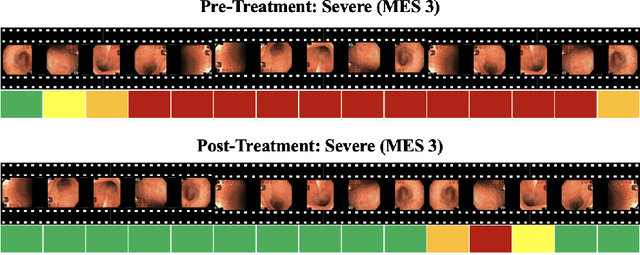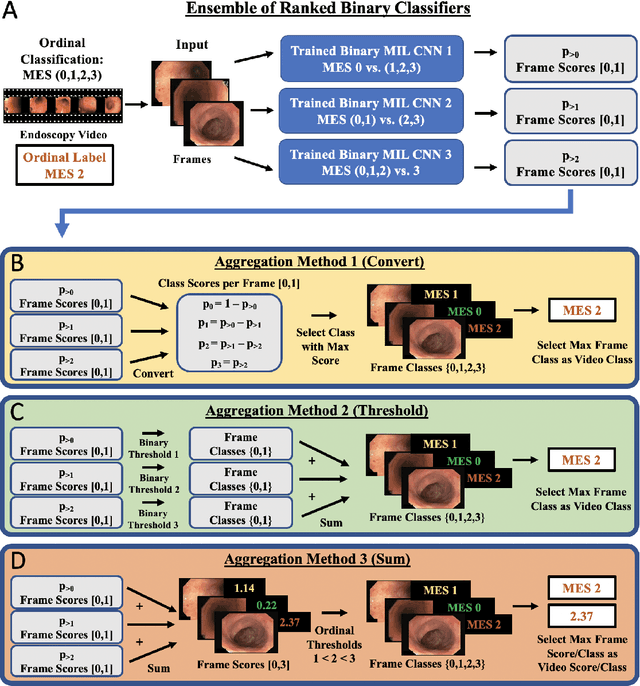Kristopher Standish
Fast, Unsupervised Framework for Registration Quality Assessment of Multi-stain Histological Whole Slide Pairs
Feb 03, 2026Abstract:High-fidelity registration of histopathological whole slide images (WSIs), such as hematoxylin & eosin (H&E) and immunohistochemistry (IHC), is vital for integrated molecular analysis but challenging to evaluate without ground-truth (GT) annotations. Existing WSI-level assessments -- using annotated landmarks or intensity-based similarity metrics -- are often time-consuming, unreliable, and computationally intensive, limiting large-scale applicability. This study proposes a fast, unsupervised framework that jointly employs down-sampled tissue masks- and deformations-based metrics for registration quality assessment (RQA) of registered H&E and IHC WSI pairs. The masks-based metrics measure global structural correspondence, while the deformations-based metrics evaluate local smoothness, continuity, and transformation realism. Validation across multiple IHC markers and multi-expert assessments demonstrate a strong correlation between automated metrics and human evaluations. In the absence of GT, this framework offers reliable, real-time RQA with high fidelity and minimal computational resources, making it suitable for large-scale quality control in digital pathology.
MEGAN: Mixture of Experts for Robust Uncertainty Estimation in Endoscopy Videos
Sep 16, 2025


Abstract:Reliable uncertainty quantification (UQ) is essential in medical AI. Evidential Deep Learning (EDL) offers a computationally efficient way to quantify model uncertainty alongside predictions, unlike traditional methods such as Monte Carlo (MC) Dropout and Deep Ensembles (DE). However, all these methods often rely on a single expert's annotations as ground truth for model training, overlooking the inter-rater variability in healthcare. To address this issue, we propose MEGAN, a Multi-Expert Gating Network that aggregates uncertainty estimates and predictions from multiple AI experts via EDL models trained with diverse ground truths and modeling strategies. MEGAN's gating network optimally combines predictions and uncertainties from each EDL model, enhancing overall prediction confidence and calibration. We extensively benchmark MEGAN on endoscopy videos for Ulcerative colitis (UC) disease severity estimation, assessed by visual labeling of Mayo Endoscopic Subscore (MES), where inter-rater variability is prevalent. In large-scale prospective UC clinical trial, MEGAN achieved a 3.5% improvement in F1-score and a 30.5% reduction in Expected Calibration Error (ECE) compared to existing methods. Furthermore, MEGAN facilitated uncertainty-guided sample stratification, reducing the annotation burden and potentially increasing efficiency and consistency in UC trials.
PSO-Net: Development of an automated psoriasis assessment system using attention-based interpretable deep neural networks
Jan 30, 2025Abstract:Psoriasis is a chronic skin condition that requires long-term treatment and monitoring. Although, the Psoriasis Area and Severity Index (PASI) is utilized as a standard measurement to assess psoriasis severity in clinical trials, it has many drawbacks such as (1) patient burden for in-person clinic visits for assessment of psoriasis, (2) time required for investigator scoring and (3) variability of inter- and intra-rater scoring. To address these drawbacks, we propose a novel and interpretable deep learning architecture called PSO-Net, which maps digital images from different anatomical regions to derive attention-based scores. Regional scores are further combined to estimate an absolute PASI score. Moreover, we devise a novel regression activation map for interpretability through ranking attention scores. Using this approach, we achieved inter-class correlation scores of 82.2% [95% CI: 77- 87%] and 87.8% [95% CI: 84-91%] with two different clinician raters, respectively.
Arges: Spatio-Temporal Transformer for Ulcerative Colitis Severity Assessment in Endoscopy Videos
Oct 01, 2024Abstract:Accurate assessment of disease severity from endoscopy videos in ulcerative colitis (UC) is crucial for evaluating drug efficacy in clinical trials. Severity is often measured by the Mayo Endoscopic Subscore (MES) and Ulcerative Colitis Endoscopic Index of Severity (UCEIS) score. However, expert MES/UCEIS annotation is time-consuming and susceptible to inter-rater variability, factors addressable by automation. Automation attempts with frame-level labels face challenges in fully-supervised solutions due to the prevalence of video-level labels in clinical trials. CNN-based weakly-supervised models (WSL) with end-to-end (e2e) training lack generalization to new disease scores and ignore spatio-temporal information crucial for accurate scoring. To address these limitations, we propose "Arges", a deep learning framework that utilizes a transformer with positional encoding to incorporate spatio-temporal information from frame features to estimate disease severity scores in endoscopy video. Extracted features are derived from a foundation model (ArgesFM), pre-trained on a large diverse dataset from multiple clinical trials (61M frames, 3927 videos). We evaluate four UC disease severity scores, including MES and three UCEIS component scores. Test set evaluation indicates significant improvements, with F1 scores increasing by 4.1% for MES and 18.8%, 6.6%, 3.8% for the three UCEIS component scores compared to state-of-the-art methods. Prospective validation on previously unseen clinical trial data further demonstrates the model's successful generalization.
Automatic Estimation of Ulcerative Colitis Severity from Endoscopy Videos using Ordinal Multi-Instance Learning
Sep 29, 2021



Abstract:Ulcerative colitis (UC) is a chronic inflammatory bowel disease characterized by relapsing inflammation of the large intestine. The severity of UC is often represented by the Mayo Endoscopic Subscore (MES) which quantifies mucosal disease activity from endoscopy videos. In clinical trials, an endoscopy video is assigned an MES based upon the most severe disease activity observed in the video. For this reason, severe inflammation spread throughout the colon will receive the same MES as an otherwise healthy colon with severe inflammation restricted to a small, localized segment. Therefore, the extent of disease activity throughout the large intestine, and overall response to treatment, may not be completely captured by the MES. In this work, we aim to automatically estimate UC severity for each frame in an endoscopy video to provide a higher resolution assessment of disease activity throughout the colon. Because annotating severity at the frame-level is expensive, labor-intensive, and highly subjective, we propose a novel weakly supervised, ordinal classification method to estimate frame severity from video MES labels alone. Using clinical trial data, we first achieved 0.92 and 0.90 AUC for predicting mucosal healing and remission of UC, respectively. Then, for severity estimation, we demonstrate that our models achieve substantial Cohen's Kappa agreement with ground truth MES labels, comparable to the inter-rater agreement of expert clinicians. These findings indicate that our framework could serve as a foundation for novel clinical endpoints, based on a more localized scoring system, to better evaluate UC drug efficacy in clinical trials.
 Add to Chrome
Add to Chrome Add to Firefox
Add to Firefox Add to Edge
Add to Edge